- Home
- Marthe Jocelyn
Mable Riley
Mable Riley Read online
For Mable Rose and Annie Pauline,
my grandmothers
And for Joy and Gordon,
my parents
FRIDAY, AUGUST 30, 1901
Such a long day of travel we have had before arriving here! But I may not write about it now, for Viola is scolding me to blow out the light. She has been such a crosspatch since we began our journey at 5:30 this morning that I dare not test her further. How she can think of sleeping, I know not. I am twitching with excitement, imagining all that awaits us now that we have left our home. Viola will be quite sorry that she ordered me to bed, for I shall be wriggling next to her for several hours yet!
SATURDAY, AUGUST 31
11:45 A.M.
Let me show our new address at once:
Misses Viola and Mable Riley
c/o Mr. Howard Goodhand
Goodhand Farm
Sellerton, Perth County
Ontario, Dominion of Canada
North America
The World
Is this not grand? Viola's new position as teacher in the Sellerton School requires her to board somewhat closer than our crowded little house in Ambler's Corners. After much conversation, it was decided that I should come with her. Hurrah! I had many opinions to contribute, for it was my dearest wish to come away. I quite despair of finding inspiration at home. I do love my dear mother, but she is so weary and dull from her daily toils that her greatest escape is to tell a story to Flossie and Bea at bedtime. I promised to miss my sisters and my brothers, Teddy and Arthur, also, but confess it will be a relief not to be minding them every moment.
In Sellerton I am to take my eighth-grade examinations and be my sister's assistant with the younger scholars. I am determined to keep a record of our adventures this year. Please may there be some!
(We are summoned to luncheon. I will return.)
2:10 P.M.
Luncheon was cold chicken (too dry), buttered peas (a bit slippery), and bread, which was not so light or tasty as Mama's. Mrs. Goodhand has not such a good hand in the kitchen(!).
I had been secretly wishing that after a train journey of such length, we would find ourselves in a new world. Somewhere with mountains, perhaps, and a castle, or a bustling city with bridges and electric lights! I knew better, of course, but there was a small hope to find something extraordinary. Unless the “Station Episode” may qualify? I will recount….
The train brought us to our destination just as twilight wrapped the world in a shimmering cloak of blue velvet. (Am I not poetic?)
Because of the gloom, we could not see much of the town, Stratford, where the station lies. We bid farewell to our carriage companions, a Mrs. Dreyer and her fussy baby. Some partings are a blessing, and we welcomed the sight of the caboose clattering away into the darkening night. We were confused to disembark and discover our party not at hand to meet us as had been promised. It soon unfolded, however, that our host's tardiness allowed us to witness a small drama on the platform.
Another young lady had departed the train with us. She had shining auburn hair and a green cape. She was greeted by a gentleman with a black mustache.
“Helen!” he cried, and flung his arms about her without restraint.
“Oh, Phillip,” she said, though how she could breathe to speak, I know not, the embrace being so forceful. I held my own breath, as if it were I who was so entwined.
Next, their noses bumped and then they were kissing, right there on the station platform! Not a brief kiss, either, but lengthy and fueled by passion, I could tell. They were quite heedless of the onlookers, who shortly before had been gathering luggage but now were gaping like yesterdays fish.
I nudged Viola and looked to her to share the thrill of the moment. She was staring quite as hard as I until I caught her eye. “Shush,” she said, blushing, and pulled me a little away. Just then a woman with a hefty bosom and a stern look stepped forward to tap the kissing gentleman's arm with the handle of her parasol.
“What are you thinking, man?” she hooted, jabbing him again when he did not break from the embrace. “You must stop this at once! Indecent behaviour is not permitted here!”
The kissers turned to gaze at her, as a cluster of factory girls in smocks giggled from the sidelines.
Sadly, it was at this moment that our driver appeared and beckoned us away. He declared the hovering night an urgent reason to tarry no longer. How I wished to stay and discover more! I shall have to compose more of their story for myself, later.
It was Alfred Goodhand who fetched us. He is the son in the household where the school officers have arranged for us to board. His father, Mr. Howard Goodhand, is away at a barn raising and will not return until Sunday evening. Alfred told us that we may call him Alfred and save the “Mr. Goodhand” for his father.
He is quite a merry soul with a twinkling eye, whom I guess to be about twenty. Without the humorous wink, he might be called lumpen, shaped like a sack of feed as he is. He kept us well amused for the hour it took to drive eight miles from the station. I asked if he knew of a man hereabouts named Phillip, but he did not.
The horse is called Darling. It was Alfred's cousin, Elizabeth, who gave her such a silly name. Her own horse is named Baron, which is much more dignified. I would call my horse Midnight, if ever I had one and she was black.
At the sign announcing our destination, SELLERTON 4 MILES, we spied a figure wobbling along the road atop a bicycle. The rider was hunched over and pedaling fast, cloak flapping like the sail of a toy boat. It was not until we came closer that I realized the cyclist was a woman! Her hair streamed behind her, and she briefly let go of the left handle grip to wave at us.
“Halloo there, ma'am!” Alfred called as we overtook her. I turned to see her grin in the flash of light from the wagon lantern.
“Do you suppose the wind carried off her hat?” asked Viola. “And teased out every hairpin?”
“Oh, that one's not much of a customer for hats,” said Alfred, “or hairpins, I shouldn't think.”
What did he mean by that? I wondered. I watched her disappear into the dusk, left to ride alone under the stars.
We arrived in the darkness of night. Owls called from unseen perches. Huge black trees, which by morning light turned out to be chestnuts, loomed like giant bat wings over the farmhouse. Alfred unloaded our trunks and the extra box of books school texts for Viola, novels for me.
Mrs. Goodhand came out to greet us with a lantern. She is a sturdy woman with a plain face. We saw at once where Alfred has inherited his looks. She does not have his twinkle but was kind enough.
SUNDAY, THE FIRST OF SEPTEMBER 1901 A NEW MONTH!
We were lazy this morning and did not rise until nearly eight o'clock! We had to hurry to dress, hurry to eat our oatmeal, and hurry to church, not wanting to be late for our first encounter with a new congregation.
I felt a kinship with our Reverend Mr. Farley back home. He was short and round, like a jolly angel, though Methodists do not believe in angels. I've always felt that to be a lack, actually. Surely people would be more faithful if there were pretty paintings of cherubs to contemplate during the boring bits of sermons. Alas.
(When I suggested this to Mama, she said it was yet another indication that I rely too much on appearances and do not pay enough attention to the spirit within.)
The minister at Sellerton Methodist is a Reverend Mr. Scott and has far too many unkempt whiskers to look upon without giggling. Whatever is a man thinking who grows such briars upon his face?
The sermon was “With Faith Shall We Face Our Trials.” He spoke well enough but unveiled no mysteries for me. Viola appointed herself my nursemaid and tapped my knee sharply if ever I fidgeted. She seems to think that my behaviour will reflect upon her own standing in the commu
nity.
After the service, we shook hands with Mr. Scott. I peered closely at his face to see if some sparrow might be nesting there.
We were joined at the door by Mrs. Goodhand's sister, Mrs. Campbell.
“We're pleased to meet you, Miss Riley,” said Mrs. Campbell to Viola. “We live at the next farmhouse along your road. My daughter, Elizabeth, will be one of your Grade-Eight scholars.” She pushed forward a pretty girl with honey-coloured hair, who bobbed her head in Viola's direction.
“Oh!” I cried. “You're Alfred's cousin! He told us how you named the horse.”
Elizabeth raised an eyebrow. “It's hardly worthy of a squeal,” she said, cool as a splash of water.
“You'll find Elizabeth to be a good student, Miss Riley,” said her mother, beaming. “She was top speller at the Sellerton School last year. She brought us home a ribbon.”
“Isn't that fine,” said Viola. “I have decided we'll have spelling bees on Friday afternoons to make for a lively end to the week.”
Elizabeth smiled.
“Of course, you'll have some competition from Mable here,” Viola continued, “as spelling is the one subject in which she particularly excels.”
I cast my eyes modestly down to my boot tips, but not before I saw Elizabeth's irritation eclipse her smile.
More gratifying than that, however, was having Viola declare my cleverness out loud when she normally does nothing but diminish me.
“Does Sellerton please you?” asked Mrs. Campbell.
“Yes, indeed,” said Viola, nudging me to answer also.
“We've seen none of it yet but the churchyard,” said I. “By next Sunday, I'll know better.”
I promptly received a glare from Viola and a squint from Elizabeth.
“Perhaps you do not please Sellerton,” she whispered. What had I done to incite such ill humour? Perhaps there is no one hereabouts to contest her cleverness? Or is it simply her nature to be a blot upon the page? I was quite relieved when Mrs. Goodhand remembered the roast and led us away home to the Sunday luncheon.
Mrs. Goodhand may not be the best of cooks, but the servings are abundant. I have yet to see her smile, but she keeps a tidy house without complaint. And wouldn't Mama admire her kitchen! Spacious enough for the table to seat ten if need be. Rows of plates and bowls on the sideboard, not just the one each we have at home.
Mama would find plenty to envy in every room: the fullness of the pillows on the chesterfield; the thick wool blankets stacked at the foot of our bed, awaiting frosty nights; and the width of the porch, which runs right across the front of the farmhouse. Mama has always wanted to sit on a porch at the end of a summer afternoon. The Goodhand farm is a prosperous one. We must be grateful for our good fortune and not dwell on envy.
LATER, SUNDAY NIGHT
We received quite a parade of visitors this evening, the word having got around that the new schoolmistress has arrived. By luck, we overheard Alfred comment that his mother might make an extra pie for later, or Viola and I would have been caught unprepared. Thanks to said remark, however, Viola put on her new collar and I tidied my hair, using my best ribbon. Viola came under much scrutiny from the neighbours, as did her assistant, I'm pleased to say.
Only minutes after the kitchen was recovered from supper, the company began to appear.
“Ah, Mrs. Forrest,” said Alfred, opening the door. “I might have known you'd be the first.” He went past her into the yard, as though grateful to have animals to tend.
Mrs. Goodhand explained to us that Mrs. Forrest's husband owns the Bright Creek Cheese factory just outside Stratford. I quickly hid my surprise at the sight of her. She was the same woman who had scolded Phillip and Helen for kissing at the train station! She now seemed ready to stand in judgment upon us.
“Well, well, well,” said Mrs. Forrest, inspecting Viola as though she were a new dress. Sharp eyes behind spectacles roamed from my sister's hair to her toes. Mrs. Forrest leaned in closely enough to examine Violas seams.
“We weren't pleased to hear there was a woman hired,” she said. “We've never had a woman teaching in these parts.”
“I expect there will be more women every year training to be teachers,” said Viola. “Times are changing, it seems.”
“We're not pleased with the notion of change,” said Mrs. Forrest. “Women riding bicycles and such nonsense is more change than we care to entertain. You don't have one of those machines, do you?”
“No.” Viola smiled.
“You're very young.” Mrs. Forrest sniffed. Perhaps she spoke with regret, as her own bloom was certainly long gone. Her hair was dull, her complexion waxy, her neck a wreath of folds above an unflattering pink shirtwaist with too many flounces. One should not wear flounces upon such an ample form!
“I'm fully nineteen,” said Viola, calm and cool. I do admire my sister when she uses that tone on someone other than myself. She turned nineteen three weeks ago.
“I'm trusting two pupils into your care,” said Mrs. Forrest, “my precious Cathy and my little Frank. We were most attached to your predecessor, Mr. Tamblyn.” She pointed her finger at Viola. “I'll be keeping an eye on you. We expect high standards in these parts.”
“I passed my examinations at the Normal School with honours.”
“We'll see about honours,” said Mrs. Forrest, but first she was seeing about the wedge of apple pie handed over by Mrs. Goodhand.
Next came Mrs. Campbell and Elizabeth, whom I ignored with utmost civility, preferring to help with the tea and pie cutting than to court her snippiness. A while after, a Mr. and Mrs. Brown arrived with their twin boys, Henry and Joseph. I must say, there were never such handsome boys at home! And here is a pair so much alike as two blades of grass!
I saw at once the change in Elizabeth when the boys shuffled into the kitchen. She sparkled like a diamond ring on a lady's finger and used more giggles in ten minutes than in the previous full hour! She is clearly a girl used to being the centre of attention.
“I've been waiting for good company,” she complained. “There's no one here worth a moment's conversation.”
Viola was engaged with Mrs. Forrest and did not hear Elizabeth continue. “What do you think of our new teacher?”
“She's pretty,” said one.
“Ha,” said Elizabeth.
I made busy repolishing the teaspoons.
“It's her first appointment,” said Elizabeth.
The boys laughed. “Shall we have a dare of who first makes her scream?” They laughed again. That might be a good diversion, I thought. I shall not warn her.
Without appearing to notice them at all, I tried to see which boy was which. I caught them looking my way more than once, so my carelessness was a good plan, I think. No more of them for now. (Except to quickly add that they are black haired, dark eyed, and faintly freckled with a dusting of brown sugar across their identical noses! Oh, lucky me!)
Mr. Goodhand arrived home from his barn raising as the company was leaving, but he was much fatigued and retired directly. We followed shortly, and that was our Sunday.
MONDAY, SEPTEMBER 2, LABOR DAY
Viola says today's holiday was begun in Toronto in 1872, to honour workers and their contribution to society. The towns and cities celebrate with parades and picnics.
Out here in the wilderness, however, Viola and I used the afternoon to finish unpacking. She has taken the top bureau drawers and I must have the bottom.
Alfred carried our trunks to the barn to be stored until we need them to go home next summer. We then took a walk about the farm, acquainting ourselves with the animals and the little forest behind. There are two goats, twenty cows, a bull, a hog, sixteen chickens, three dogs, and a cat named Captain.
The milk from the cows is sold to the Bright Creek Cheese Company. Alfred and his father milk the cows and leave the full cans in a shed by the road, to get picked up and hauled to the factory.
“Good cows make good milk,” said Alfred while he showed us
around. “Good milk makes good cheese. That's my father's motto. And good cheese feeds the Goodhands!”
Viola looked at me and lifted her eyebrow. I swallowed hard to keep my giggle within.
I now pause in my account to write a letter home. Alfred has offered to take letters to the post office tomorrow, knowing our mother must be eager to hear of our safe delivery here.
It is peculiar to be dropped with a plunk into the heart of another family and to leave our own like old boots in a distant cellar.
LATER
We have learned that it is Mr. Goodhand's habit to sit beside the stove after supper while his wife (and his boarders) clean up the kitchen. He sits in his particular chair, rubbed to threads on the armrests. He selects certain passages to recite aloud from the newspaper and slips in his own comments.
#x201C;Will you listen to this,” he said tonight.
“PERSONAL AND SOCIAL NOTES
The whistle of the Bright Creek Cheese factory, which formerly blew at 6:45 A.M., will in the future blow at 6:40 A.M.
“That's clever, that is. That's Mr. Francis Forrest who thought that one up. Fourteen employees each coming five minutes earlier gives him more than an hour extra work per day. Figure it out for yourself.
“Mr. and Mrs. Abel Davis departed today to spend a week at the Pan-American Exposition in Buffalo.
“Best of luck to them,” said Mr. Goodhand. “Hold your horses here it is, here it is. We appear to be housing a person of fame under our roof.
“Miss Viola Riley, new teacher of Sellerton School, arrived on Friday and is boarding with Mr. and Mrs. Howard Goodhand, of Goodhand farm.
“Miss Riley was graduated from St. Catherine's Normal School and takes her first position here. She is accompanied by her sister Miss Mable Riley. Although we are saddened by the departure of Mr. Augustus Tamblyn after twenty-eight years of instruction, we wish to welcome Miss Riley to the community”

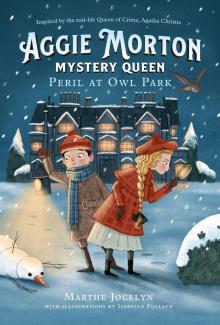 Peril at Owl Park
Peril at Owl Park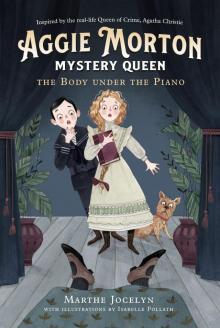 The Body under the Piano
The Body under the Piano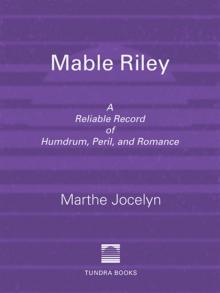 Mable Riley
Mable Riley Earthly Astonishments
Earthly Astonishments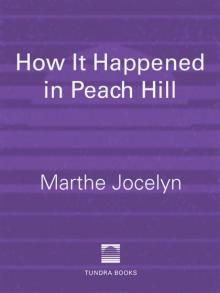 How It Happened in Peach Hill
How It Happened in Peach Hill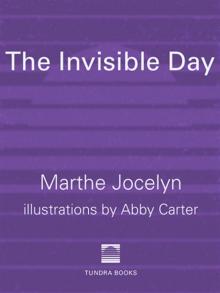 The Invisible Day
The Invisible Day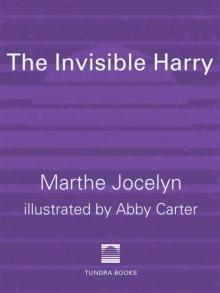 The Invisible Harry
The Invisible Harry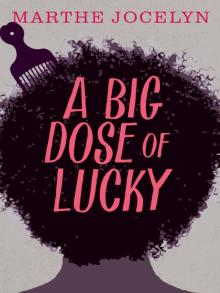 A Big Dose of Lucky
A Big Dose of Lucky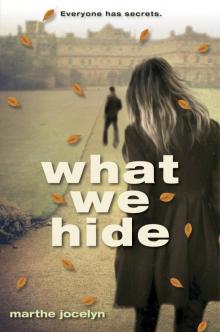 What We Hide
What We Hide Would You
Would You Secrets
Secrets First Times
First Times The Invisible Enemy
The Invisible Enemy Folly
Folly